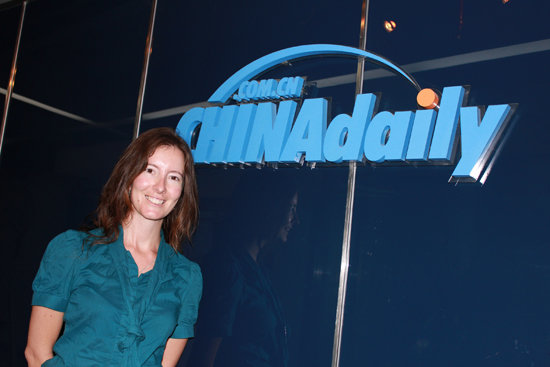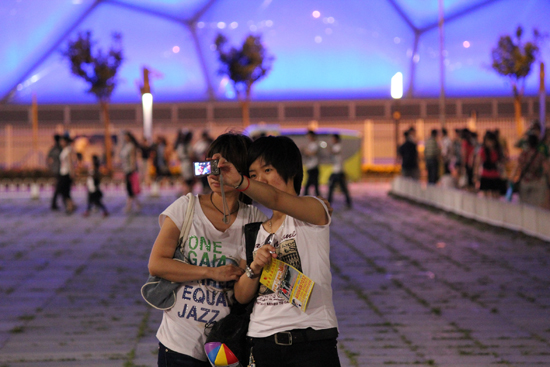
OPINION: In Beijing, I attended a talk by Guardian reporter Jonathan Watts about his book on China and the environment: When a Billion Chinese Jump. The book title grabbed me.
Watts explained that as a youngster, an older relative put the fear of god in him by saying if the entire population of China leapt into the air at the same time, the impact as they landed back on earth would send the planet spiralling off its axis. Turmoil.
His analogy is simple – the future of China, is the future of the planet.
And that is what drew me as a recently graduated journalist to a three-month stint interning with the state-owned China Daily in Beijing, helped along by AUT’s Pacific Media Centre and the Asia New Zealand Foundation.
New Zealand’s proximity to China, and the ever-increasing trade relationship between the two nations, meant the trip was even more relevant.
Much of my perceptions of China were based around the politics and economics of the place – the Communist Party, the Great Firewall of China, human rights, Made in China – and I craved a more intimate understanding of the country and its peoples.
I knew such an understanding would make me a better journalist, especially when reporting on China-specific issues in New Zealand.
Huge privilege
And you can’t gain that sort of understanding on a whistle-stop tour of top tourist spots. This internship offered me the huge privilege of being static in a foreign place – socialising with work colleagues, negotiating my local apartment block, eating and shopping in a Chinese neighbourhood, and, of course, working in a foreign, state-owned newsroom.
Reporting was not a core part of my job in China. I was stationed with the China Daily’s online team as a “foreign expert”, responsible for polishing the copy of my local colleagues – I was a subeditor.
As seems to be the newsroom culture other overseas interns have experienced, MSN is king. Word got out I was available to polish, and reporters invited me to be their friend in cyber space, then sent through their copy. When the work was done, I was thanked with a digital smile, thumbs up, or handshake, sometimes even a digital red rose.
I was also proactive in chasing stories, when the language barrier wasn’t an issue, and my editor encouraged me to write opinion and travel columns. As a fledgling reporter, this chance to offer my own perspective and see it published was a huge treat.
Another satisfying part of my role was being involved in reporter training. Many of my local colleagues at the China Daily were top English literature graduates, but few had specific journalism training. I presented a workshop on story structure that I received encouraging feedback on.
Another issue that sparked my interest in the newsroom was cultural variations in journalism ethics and the way this affected what was reported and the way it was reported.
Unwritten guidelines
For example, in my first week I flagged a story on suicide to my editor. As a journalism student in New Zealand, lecturers talked to us about some of the unwritten guidelines for reporting suicide. My editor and the reporter were interested in the points I made – they had never thought of the issues around how suicide was reported and generally treated it as they would a crime or accident story.
No one way is right or wrong, and with suicide, as with any social issues, there are many cultural factors tied up with it, so it is natural the reporting styles would be different.
During the discussion, the reporter asked, after hearing some of the reporting guidelines generally accepted in New Zealand and also the fact suicide rates are so high here: “Why the cover-up? It obviously isn’t working.”
These kind of frank interactions were constant in my job in Beijing, and they kept me on my toes, continuously challenging and making me reassess my worldview. I would have thought I would be the only one raising curly questions around reporting, censorship and cover ups.
Many memorable and rewarding moments were outside my official work day. Colleagues were more than happy to take me out for sightseeing and meals, I got involved with weekly work badminton and yoga sessions, formed a mahjong group, and a workmate lent me her Beijing cruiser, so I could cycle around the gloriously flat city like a local.
I joined a weekly Chinese film club and a hiking club, which ventured out of the ever-pulsating city on weekends, and through the Asia New Zealand Foundation, the NZ Embassy and other contacts, met up with Kiwis and other expats living exciting, inspiring lives in China.
My lasting impression of China is of the people. On my arrival, I had been so fixated on the enormity of China as an economic and political power but, within hours, my focus shifted. I realised I had underestimated the vitality of the people and culture.
Politics snuck into my daily life now and again but, for the most part, being part of a community of Chinese people – at work, where I lived and where I socialised – and what I learnt from people on a personal level, is what I cherish now.
Kim Bowden on the Asia New Zealand Foundation website




